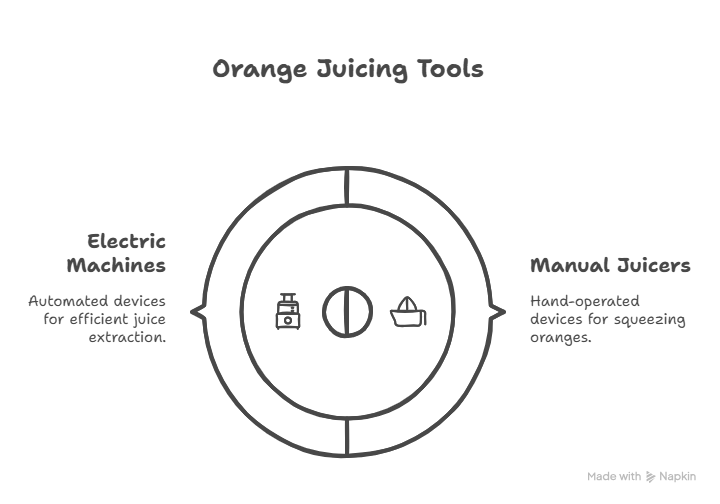
Juicing oranges can be a delightful and refreshing experience, but to truly master orange juicing, having the right tools is essential. This document explores the various tools that can enhance your juicing process, ensuring you extract the maximum flavor and nutrition from your oranges. From manual juicers to electric machines, we will delve into the pros and cons for Mastering Orange Juicing of each tool, helping you make an informed decision for your juicing needs.
Here is a Step-by-Step Guide to Juicing Oranges!
1. Manual Citrus Juicer
A manual citrus juicer is a classic tool that allows you to extract juice by hand. These come in various designs, including handheld reamers and larger press-style juicers.
Pros:
- Cost-effective: Generally more affordable than electric juicers.
- Easy to clean: Most manual juicers can be easily rinsed and are often dishwasher safe.
- No electricity required: Perfect for outdoor use or in places without power.
Cons:
- Labor-intensive: Requires more physical effort to extract juice.
- Limited capacity: May not be ideal for juicing large quantities at once.
2. Electric Citrus Juicer
Electric citrus juicers automate the juicing process, making it quicker and easier to extract juice from multiple oranges.
Pros:
- Efficiency: Can juice multiple oranges in a fraction of the time it takes with a manual juicer.
- Less effort: Requires minimal physical effort, making it suitable for those with limited strength.
- Consistent results: Provides uniform juice extraction.
Cons:
Higher cost: Generally more expensive than manual options.
More complex cleaning: May have more parts that require thorough cleaning.
3. Citrus Reamer
A citrus reamer is a simple tool that consists of a pointed, ridged end designed to extract juice by twisting it into the fruit.
Pros:
- Compact and portable: Easy to store and take on the go.
- Inexpensive: Typically one of the cheapest juicing tools available.
- Versatile: Can be used for other citrus fruits as well.
Cons:
- Time-consuming: Not ideal for juicing large quantities quickly.
- Requires manual effort: Can be tiring if juicing many oranges.
4. Citrus Press
A citrus press is a more advanced manual juicer that uses leverage to extract juice efficiently.
Pros:
- High juice yield: Maximizes juice extraction with minimal effort.
- Durable: Often made from sturdy materials that last longer.
- Easy to use: Simple lever mechanism makes juicing straightforward.
Cons:
- Bulkier: Takes up more space in the kitchen.
- Higher price point: More expensive than basic manual juicers.
5. Blender
While not specifically designed for juicing, a blender can be used to make orange juice by blending the fruit and then straining it.
Pros:
- Multi-functional: Can be used for smoothies and other recipes.
- High capacity: Can juice large quantities at once.
- Quick: Fast blending process.
Cons:
- Requires straining: You will need to strain the pulp for a smoother juice.
- More cleanup: Blenders typically have more parts to clean.
Conclusion
Mastering orange juicing involves understanding the various tools available and selecting the right one for your needs. Whether you prefer the simplicity of a manual juicer or the efficiency of an electric model, each tool has its unique advantages and disadvantages. By considering your juicing habits and preferences, you can choose the perfect tool to elevate your orange juicing experience. Enjoy the fresh, vibrant flavors of homemade orange juice with the right equipment at your disposal!
Ready to take your knowledge a step further? Read A Guide to Essential Orange Juicing Tools